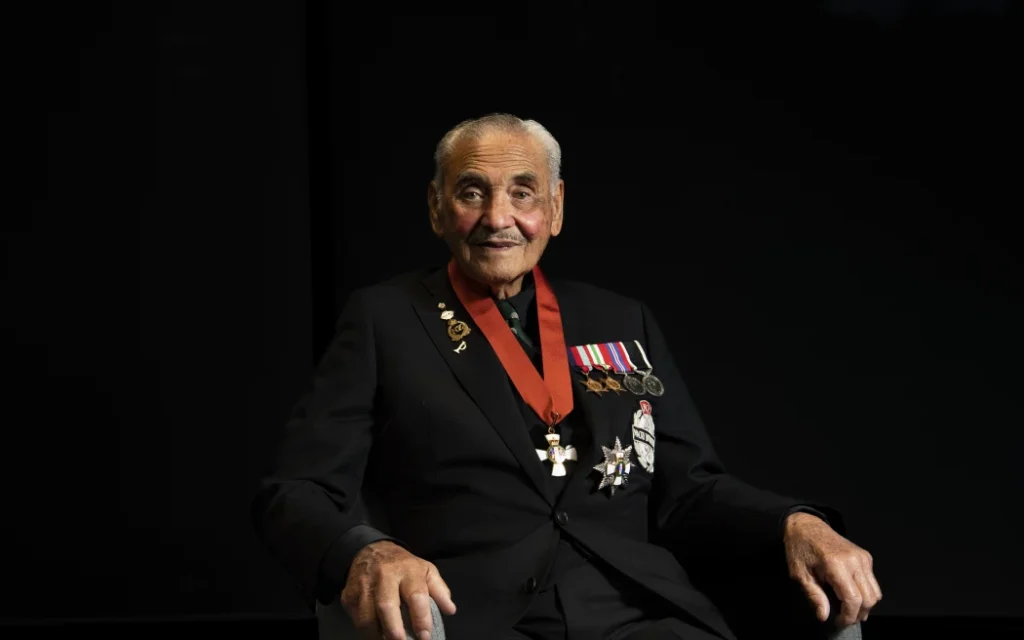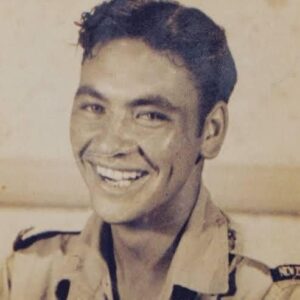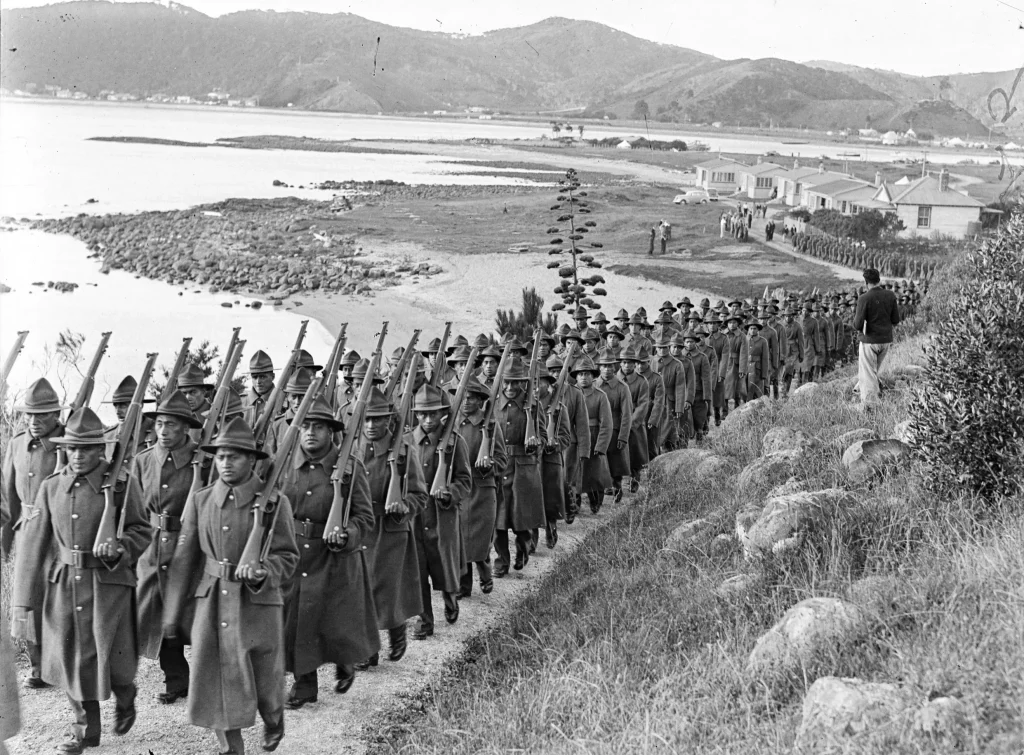
Tā Robert Nairn Gillies (Photo NZ Defence Force)
Tā Robert (“Bom”) Nairn Gillies was farewelled at Te Papaiouru Marae in Rotorua this week. The 99-year-old was the last remaining member of the 28th Māori Battalion.
He served in Northern Africa and Italy during World War II in B Company, from 1942 to 1945.
In his later life, he fought hard for greater recognition of Māori soldiers, driving a Waitangi Tribunal military veterans kaupapa inquiry.
In 2016, he gave evidence to the inquiry — about his experiences in battle, the racism he faced on his return to Aotearoa, and his regret at ever going to war.
Here he is in his own words.
My name is Robert Nairn Gillies. I was born in Hastings and descend from both Ngāti Kahungunu and Te Arawa. We moved to Ōhinemutu in 1931 after the earthquake, as my mother was from here.
In my family, there was me, my parents, three sisters as well as a fourth adopted sister, and my five brothers, although one sister died very young, before we left Hastings.
We were brought up in a bad economic slump; the whole world was in the slump and times were hard. People were living on the road, and I can remember people living in tents. It was hard, but we were always all right.
When we moved to Ōhinemutu, we moved into my grand aunt’s place, the whole family. I can’t remember how long we stayed together, but some of the family went back to Waimarama. Four of us stayed behind: my sister Wimmer McCrae who married Maka McCrae, myself and two brothers.

Robert Gillies as a young soldier.
Enlistment
I enlisted on February the 3rd, 1942, when I was 17 years old. My mother’s Bible said I was born in 1924, but the government says I was born in 1925. There was a mix-up somewhere, so we will say I was 17 years old. My brother Ewan also served, but he had gone in the 7th reinforcement, and he left a while before I enlisted.
When I enlisted there was a whole heap of us from Rotorua. Sindu Morrison, Gus Cleal, John Ransfield, who became our company commander, Rangi Simeon, Lofty Haupapa, Riko Simon and many others I can’t remember.
I enlisted at the Ritz Hall where the Pak’n’Save is now, that is where the enlistment office was. I had had a couple of goes before that, but they had kicked me out, and that had happened to a lot of us little fellas. But they must have been getting short of manpower.
When we left Rotorua to go to camp, there was a lot of us, the train was full. Guys who had come from surrounding districts all boarded with us, and I remember at least one guy boarding with us who hadn’t even joined the army. He came from Ngapuna, he was quite old. Although there was a few older guys with us.
The train took us to camp at Papakura and we all marched in. Kauwhata, who we nicknamed Cow-Fart, had enlisted but hadn’t been called up. That didn’t stop him, he marched in with us and they took him.
I can’t remember how long we were in training camp, but some of us were also sent to Pukekohe. I remember Sindu Morrison being sent there. I stayed in Papakura.
While we were there, they went through all the formalities, issued our uniforms, and then we started training. We would get up early in the morning and go through physical exercises, then have breakfast. After breakfast, we did military training. We lined up in three ranks and they taught us how to come to attention and all that sort of thing. They taught us how to be soldiers. I didn’t enjoy the training, but I soon got used to the routine.
We used to have live firing and night exercises. We would travel out in the country and train in the scrub, they taught us how to attack. We learned all about discipline and how to keep healthy. There were Pākehā units in the camp as well in Papakura, but we mostly spent time with our own fellas.
We were the 10th reinforcement, and when we went to Papakura we joined up with the 8th and the 9th. The Japanese were moving down through the Pacific, so we were held back. They sent us up to Ōhaeawai, just outside Kaikohe. They got all the Māori from other units and put them in one unit, and they formed the Battalion there. They called it the 2nd Māori Battalion, even though a lot of people don’t know there was a 2nd Māori Battalion.
We were up north for quite some time. George Bertrand was our Battalion Commander, and Rangi Royal was the 2IC. They had both returned from the war, as well as Don Stewart, Tu Manahi, and they joined the 2nd Māori Battalion to train us. Tu Manahi was from Mourea, and while we were up there, he was our Commander.
The 8th and 9th reinforcements left from there to get overseas. They were rushed overseas because they were getting short on personnel.
Martin McCrae came home at this time also on compassionate leave, and ended up as our RSM (Regimental Sergeant Major, also known as Warrant Officers). He was a Senior Non-Commissioned Officer. I knew Martin from home, as it was his brother Maim who had married my sister.
We dug trenches in Paihia, but when the scare about the Japanese went down, we left the north.
Military service
In about May 1943, we went overseas. We left Papakura by rail, on our way to Wellington where we were to be shipped off from.
The boat we left on was the Nieu Amsterdam, it was a huge liner, and we were told it was the third biggest liner in the world. There was thousands of troops on that boat, a number that I heard was 7,000, although I don’t know if that is official.
It was the same boat that had brought the Battalion home for furlough.
It took five days to cross the Tasman, and it was stormy. It was so stormy that our escorts, the destroyers, used their lights to signal to us that they couldn’t even have a cup of tea.
We put in to Hobart but we did not stay long. Then we called in to Fremantle, and from there we sailed off to Port Tewfik, the entrance to the Suez Canal. We got off there and they took us to Mena Camp outside Cairo.
We trained at Melia Camp for a while, and then we transferred to Maadi Camp which was the main camp for New Zealand soldiers. That is where we joined the 28th Māori Battalion.
I knew quite a bit about the Battalion growing up, they were always in the news. They had become quite famous, and we were all proud of them. When I joined up with them, I was always worried and always anxious.
We were moved to Borg EI Arab, just outside EI Alamein, then marched to the port at Alexandria. It took us about a week, and because it was so hot we had to march at night. It was so hot that during the day you couldn’t rest properly.
We boarded boats there and went over to Italy. We landed at Taranto at the toe of Italy, and there we made a camp for ourselves. We kept training there for a little while.
From there, we went to Bari Camp. This is where I was involved in my first battle, the Battle of Sangro River. We didn’t know what was coming, but I remember I was near an officer who had his radio, he was talking to a Platoon Commander, Johnny Pile, who got hit. I remember hearing Johnny gurgling over the radio as he died.
After that battle, we regrouped, and then they moved us up to attack Orsogna, which was my second taste of battle. After that, we dug in, and we were there for quite a while. We would get bombarded, and we lost one of our mates there who was from Taupō, Joe Te Whare. He was cut in half, and all that was left of him was from the belt down. Sgt Harold Ruha from Mōkai wrapped his legs in a gas cape and dropped them into the trench and buried him, marking the grave with his rifle.
Johnny Dinsdale was my trench-mate, and he got killed at Cassino.
While we were fighting, we used te reo Māori to beat the Germans. Spider Whitcliffe, who was from Whakarewarewa, would take messages in English and translate them to Māori. He was so useful that after Cassino when we got to go home, they kept him on for two weeks. I remember he didn’t like that.
We lost some of our mates, and this was tough on us. After these experiences, you were mentally scarred.

Members of the Māori Battalion at Waitangi in 1940. (Photo: RNZ, supplied by Professor Angela Wanhalla, University of Otago.)
Return home
Growing up, we, as Māori, were always treated as second-class citizens. To be honest, when I served, I was a young man, and there were things that I was not aware of, but I always felt something was there, and there are things that, as I have become wiser, I have become more aware of. The Crown was happy to treat us as second-class citizens, yet when they needed us, they were happy to use us.
After returning I remember my wife and I, we went to Hamilton to see her brother playing the British Isles. I went to the hotel office to change a 5-pound note, and the girl at the office complained to her manager about me being there. These small things stick in my mind, and I will never forget it. I had served for a country that did not, and stilI does not, respect me as a Māori.
I met my wife at a dance at Tamatekapua. Her name is Rae Ratima and she had come to Rotorua to study nursing. My wife’s view on the war, and specifically Māori involvement in the war, helped to form my views on this topic later in life.
After marrying Rae, we moved back to Waimarama where a block of land came up for sale. The Native Department was looking to put more Māori on the land. With the help of an accountant, Hugh Baird, I filed an application through the Māori Trustee to help me buy this piece of land. At the time, there were no buildings on it, so we also made formal applications to assist in putting a house and a woolshed on the block.
My application was declined, and instead, the land was sold to a wealthy, retired Pākehā farmer. All the decision makers of the relevant department were Pākehā, even the Minister of Māori Affairs was Pākehā, and I believe this affected my application.
I remember going to Whanganui to visit my son, Te Taupua, who was in hospital. After our visit, my wife fell sick, so we decided to book into a hotel for the night. We were told there was no vacant rooms.
I left and went to a phone box and called the same hotel to book a room; when they couldn’t see I was Māori, it turned out there was rooms available, and we booked one.
I will never forget the look of shock and surprise on the hotelier’s face when I walked back in to check in. This was just one of the many instances of racism I experienced after serving for the Crown.
Māori should not have served with the Crown. We were owed too much, there was no partnership, and all they wanted to do was take. In the war, they took our young men, and this is another thing that we were never going to get back.
Even if men did make it home, they died from the booze. A lot of my mates would drink every day, and this was the war still killing our men even after they had come home.
The families of servicemen were affected also. Whenever someone was killed overseas their photos were taken to the marae where there would be a tangi.
It took me three months to find a job and to settle down when I came home because it was so hard to adjust. I was lucky. For others, the booze took over their lives, and their experiences left them mentally scarred and affected their relationships with their families.
Conclusion
I look back and I ask: “Was it worth it?” The cream of our race lie overseas while we continue to struggle against the Crown to this very day.
If I had the choice again, I would not fight in that war. In hindsight, I know now that I am, and I should have been, a conscientious objector.
As Māori, we lost our leaders to these wars, and we have found it hard to develop and to progress as a people. Our relationship with the Crown was not a partnership because while they benefited so much, things just got worse for us.
Tā Robert Nairn Gillies (1925 – 2024)